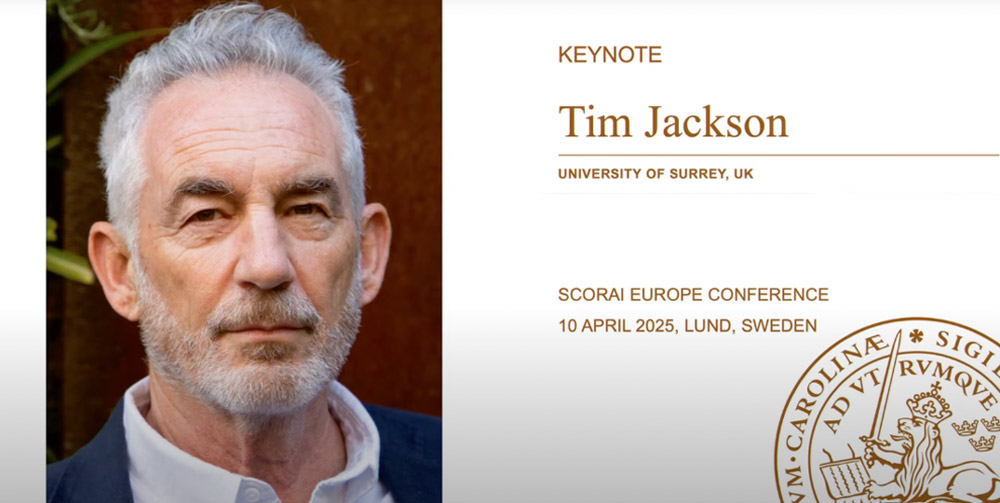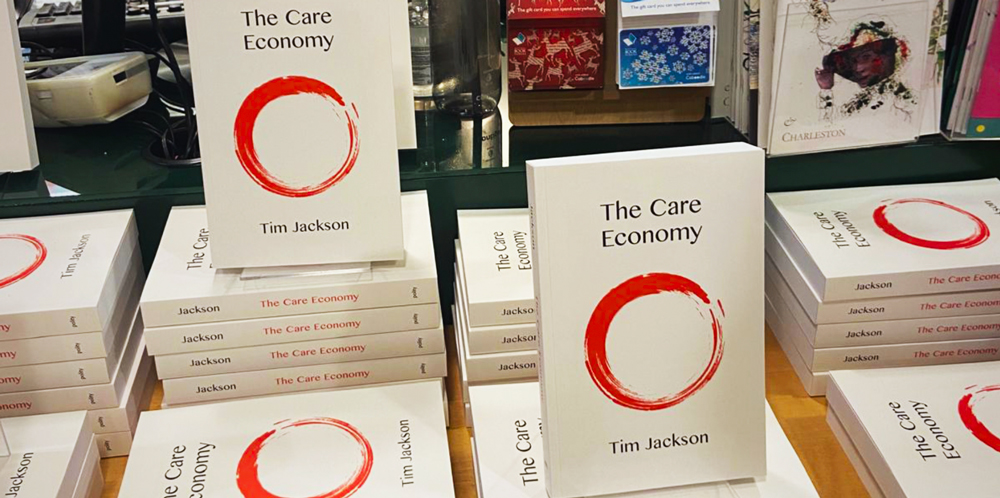
Contact
For urgent media requests, please email
Linda Geßner
l.gessner@surrey.ac.uk
For all other inquiries, please email:
office@timjackson.org.uk
Postal address:
Prof Tim Jackson
Centre for the Understanding of Sustainable Prosperity
University of Surrey
GU2 7XH Guildford
UK
Press kit
For background information and photos, please see the Press Kit.
Latest posts
In this episode of the Economics for Rebels podcast, Tim Jackson speaks to Alexandra Köves about care as a philosophical principle and economic imperative—challenging the deep structures of a growth-driven patriarchal economy and its systemic neglect of wellbeing.
Capitalism is an illness: it’s killing our planet, and by extension, us. Economic instability and environmental concerns are symptoms that can only be cured by redefining prosperity in terms of health and wellbeing, so that we can create sustainable, equitable societies. Tim Jackson joins Cities 1.5 to discuss his new book The Care Economy, arguing that redefining prosperity around care—not growth—offers a path to heal our economy, our healthcare systems, and the planet itself.
Hosted in partnership by the David Hume Institute and EICC Live, this engaging Edinburgh event featured Tim Jackson in conversation with Dr Sarah Birrell Ivory. Together, they explored the central themes of Tim’s latest book, The Care Economy.
In his keynote for the SCORAI 2025 conference in Lund, Prof Tim Jackson presented insights from his new book The Care Economy, calling for a shift from growth-driven models to economies centred on health, care, and creativity. His keynote exposed the systemic harms of perpetual growth and argued that prioritising care is essential for a just and viable future.
To mark the launch of the German edition of The Care Economy, the Heinrich Böll Foundation hosted a special event in Berlin featuring Professor Tim Jackson in conversation with economist and historian Friederike Habermann. Together, they explored the book’s central themes, delving into its intellectual roots and discussing the urgent need to rethink our economic systems through the lens of care, wellbeing, and sustainability.
On 18 March, CUSP hosted a pre-release launch of The Care Economy at the London Review Bookshop. The evening featured a rich discussion with Professor Tim Jackson, Sir Michael Dixon, and Sir Sam Everington, moderated by Guardian journalist Zoe Williams, offering a thoughtful exploration of the book’s central themes.
No political mantra, no tech-bro fantasy, no alluring macroeconomic ideology has stemmed the persistent decline of economic growth. Let alone reversed it. To all intents and purposes, Tim Jackson writes, we are already living in a postgrowth world.
A comprehensive new review by leading experts in the sustainability science field is challenging the long-held assumption that economic growth is necessary for societal progress. Published in The Lancet Planetary Health, this paper explores the rapidly advancing field of postgrowth research and presents a compelling case for prosperity without growth.
This paper develops a stock-flow consistent, input-output model to simulate risks, opportunities, and non-linear dynamics associated with green investment, energy returns, financial risks, and various energy transition pathways to net zero.
New analysis commissioned by the Food, Farming and Countryside Commission (FFCC) has found that the costs of Britain’s unhealthy food system amount to £268 billion every year – almost equivalent to the total annual UK healthcare spend. The report by Professor Tim Jackson provides the first comprehensive estimate of the food-related cost of chronic disease, caused by the current food system.










